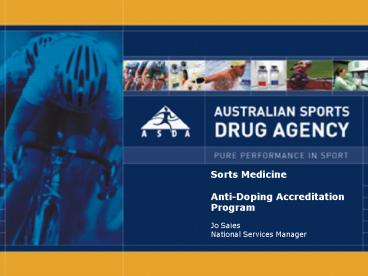The MERITS Program PowerPoint PPT Presentation
1 / 13
Title: The MERITS Program
1
Sorts Medicine Anti-Doping Accreditation Program
Jo Saies National Services Manager
2
Aim
Plan and implement a sports medicine
accreditation program to better educate and
equip Australian sports medicine officials to
make sound judgements in relation to anti-doping
issues in their professional roles.
3
Partners
- Australian Olympic Committee
- Australian Paralympic Committee
- Sports Medicine Australia (SMA)
- Australia's peak advisory body on medical and
health issues for active people - medical coverage for sporting events
- educates and accredits Sports First Aiders and
Sports Trainers - expert information to the community on Sports
Medicine issues - policy statements and guidelines critical to
safe and healthy activity - Network and information referral service on
general sport and health enquires
4
Target Group
Sports Medicine Australia (SMA) Members
Doctors, Sports Physicians, Physiotherapists,
Psychologists, Dieticians, Sports Trainers
Working with elite or sub-elite athletes
(athletes currently subject to drug testing, or
likely to reach a level where they will be tested
in the next 12 months) Working with Olympic
squads or teams in the lead up to or during
Athens 2004.
5
Rationale
- high profile doping cases highlight the role of
sports medicine officials (Andreea Raducan, Ben
Tune) - more comprehensive education of sports medicine
officials required to protect the well being of
athletes and the reputations of sports doctors. - Introduction of WADC increase in the level
of responsibility and accountability placed on
sports medicine officials - evidence of involvement of medical and
scientific professionals in systematic doping -
Finnish ski team, Tour de France
6
Objectives
Equip sports medicine practitioners to make
informed decisions in relation to anti-doping
issues Protect athletes rights Reduce the risk
of inadvertent doping Strengthen
anti-doping response
7
Structure
1. Attend yearly anti-doping workshop - ASDA
staff in conjunction with an SMA Doctor -
introductory session followed by a scenario based
workshop 2. Accreditation exercise 3.
Ongoing relationship - quarterly ASDA drugs in
sport update - subscribe to ASDA accreditation
email bulletins - free education resources
8
Content
- Responsibilities of medical staff under the
Code - Anti-Doping Rule violations and consequences
- The WADA List - minimising inadvertent doping
- Therapeutic approval
- Travelling overseas medications and testing
- Ethics, doping and sports medicine
- Supporting athletes during doping control
- Olympic and Paralympic Games information
9
Workshop Scenario - Ethics
- An elite endurance athlete you treat in your
capacity as National Team Dr has recently had
some standard blood tests. On reviewing the
results you notice some abnormal variances in
parameters which leads you to suspect this
athlete may be experimenting with EPO or some
other form of blood doping. - Given the limitations of patient-Dr
confidentiality, consider your obligations in
terms of - Duty of care as a medical practitioner
- Athlete support personnel under the WADC
- Staff/contractor of a sport to whom the WADC
applies. - Will you intervene?
- What issues do you need to consider?
- What actions will you take, if any?
10
Implementation
- Promoted and delivered through SMA State
networks - Involvement of AOC and APC
- Approximately 75 participants
- 15 achieved accreditation
- ASDA maintains a record of accredited members
- Preference that Sports medicine professionals
must be accredited in order to work with Olympic
level athletes - mailing list of all 75 participants
11
Assessment Examples of questions
An elite swimmer is treated with oral prednisone
for chronic asthma. She informs you that she has
advised Australian Swimming, via a medical
notification form, that she is an asthmatic. Is
there anything further that you or the athlete
are required to do to avoid a positive test
result? In what form and for which types of drug
testing are glucocorticosteroids prohibited? You
are acting as an athlete representative at a drug
testing session in Hungary. The original beaker
that was selected by the athlete in which to
collect a urine sample is dirty. Apparently
there are no spare beakers from which the athlete
can select a clean beaker. How would you advise
the athlete to proceed? Whilst travelling with
a sporting team through the UK, on your way to
Europe, you realise that your medical kit is
running low on codeine. You know that this is a
permitted medication in Australia, can you assume
that it is safe to purchase further stocks of
codeine to replenish your medical kit?
12
Questionnaire results
- status of medications not checked
- lack of distinction between substances and
routes of administration requiring TUE, ATUE or
no exemption - lack of distinction between TUE and ATUE
processes - concerns with testing procedure handled
differently - confusion about the status of medications
overseas
13
Evaluation
- More targeted
- engagement of partners
- Resource intensive
- Positive feedback on workshop structure
- Commitment of sports medicine professionals
to this level of involvement - Development of ongoing relationship
- Recognition of the complexity of the issues

